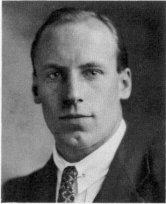

Eric Liddell is most widely known for his
refusal to run on Sunday in the 1924 Olympic Games in Paris. A committed
Christian, Liddell withdrew from his strongest event, the 100 meters - a
decision that would years later make him the subject of the
Oscar-winning film "Chariots of Fire." As an alternative,
Liddell registered to run in the 400 meters. Just moments before the
race, an American handed him a piece of paper on which was written a
passage from 1 Samuel 2:30, "Those who honour me I will honour."
Liddell ran the race with the verse in his hand and claimed Olympic Gold
and new world record with a time of 47.6 seconds. When Eric described
his race plan, he said, "The secret of my success over the 400
meters is that I run the first 200 meters as fast as I can. Then, for
the second 200 meters, with God's help, I run faster."
Born in January of 1902, Eric Liddell's
parents were Scottish missionaries working in northeastern China at the
time of Eric's birth. For twelve years, Liddell attended Eltham College,
a Christian boarding school, and then studied at Edinburgh University
where he excelled in athletics, particularly short distance running,
rugby, and cricket. In 1922 and 1923, Eric played for Scotland Rugby
Union in the Five Nations. But it was his running that distinguished him
as an athlete and after setting a British record for the 100-yard sprint
in 1923, hopes were high for Eric's strong showing in the 1924 Olympic
Games.
Eric did not disappoint. After bringing
Olympic glory to Scotland, however, Eric Liddell left success behind and
returned to China where he taught Chemistry and organized sports at an
all-boy school in Tientsin (now Tianjin). He married in 1934 and later
began working as a village evangelist, travelling the countryside in
Siao Chang, a dangerous region not suitable for his wife and two
daughters who remained behind. Eric was frequently at risk from both
hostile Communists and Chinese Nationalists who regularly pillaged and
destroyed villages, neither group sympathetic to the work of a Christian
missionary.
In 1940, the Japanese invaded China, and
Eric's family joined his wife's parents in Canada. Subsequently, the
situation in China deteriorated and Liddell was sent by the Japanese to
an Internment Camp in Weihsien, in the province of Shantung, North
China. Eric and 1,800 others, including many children, were crammed into
a detainee camp measuring only 150 by 200 yards. Inside, Liddell
organized sporting events, taught the children their studies and
continued his evangelistic work, teaching Christianity and Bible study.
It was in this Internment Camp where Eric Liddell documented his calling
to obedience. Forty years later, the notes from these writings were
obtained from his widow, Florence Liddell Hall, and compiled into the
book, "The Disciplines of the Christian Life."
Just months before liberation, Eric Liddell
died within the confines of the Internment Camp on February 21, 1945
from a large tumor on the left side of his brain - a condition he did
not know he had. Eric dedicated his life to obedience to God's will and
teaching others to live in accordance with the example Jesus established
for his followers. Eric Liddell died serving the Lord. He never saw his
third child, Maureen.
<information from http://www.truthforlife.org/blog/eric-liddell-olympic-athlete-and-missionary-china/; photo from
http://complete-in-thee.blogspot.ca/2009/10/eric-liddell.html>
|